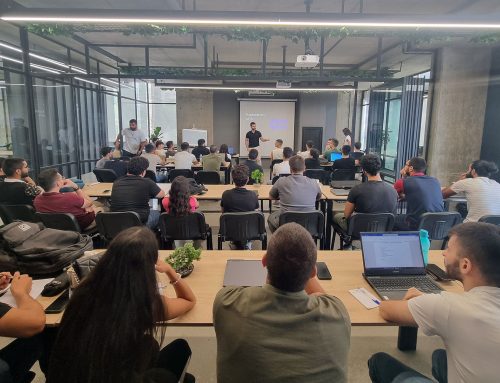According to a recent report by the World Health Organization, healthcare errors are among the top 10 leading causes of death globally. This staggering statistic underscores the urgent need for innovative solutions to enhance healthcare systems.
Enter AI, a powerful tool that holds the potential to optimize operations, improve patient experiences, refine diagnostics, and pave the way for personalized treatment plans.
Studies by the Arab Artificial Intelligence Council (AAIC) estimate that AI could add $200 billion to the combined GDP of Arab countries by 2030, while McKinsey & Company forecasts it could unlock up to $580 billion in economic value across the Middle East and North Africa by 2025.
From streamlining hospital operations to powering life-saving diagnoses, AI is poised to transform every facet of healthcare in the Arab world.
AI in Healthcare Administrations
Arabic studies by the University of Sharjah show that AI-powered automation tools can reduce administrative workloads by up to 70%, allowing healthcare professionals to dedicate more time to patients.
Administrative Workflow
AI-powered systems can automate routine tasks such as appointment scheduling, billing, and insurance processing. This not only reduces the burden on administrative staff but also minimizes errors, leading to more efficient and cost-effective operations.
Virtual Nursing Assistants
These virtual assistants can provide real-time support to patients, offering medication reminders, answering queries, and monitoring vital signs. The results are enhancing patient engagement and allowing healthcare professionals to focus on more complex tasks, ultimately improving overall patient outcomes.
Connect Disparate Healthcare Data
AI can connect disparate healthcare data, ensuring that information flows efficiently between departments. This integrated approach improves communication, collaboration, and decision-making across the entire healthcare ecosystem.
Revenue Cycle Management
Hospitals and medical institutions can benefit from AI to streamline financial processes, from billing to claims processing. Automated systems can identify billing errors, reduce payment delays, and optimize revenue collection, ensuring the financial health of the hospital.
Clinical Documentation Improvement
AI can enhance clinical documentation by automatically extracting relevant information from medical records. This not only improves the accuracy and completeness of patient records but also reduces the administrative burden on healthcare professionals, allowing them to focus more on patient care.
Supply Chain Optimization
Efficient supply chain management is crucial for ensuring the availability of essential medical supplies. AI can analyze usage patterns, predict demand, and optimize inventory levels, preventing shortages and reducing costs associated with excess stock.
Fraud Prevention
Healthcare fraud is a growing concern, leading to financial losses and compromised patient data. AI can play a crucial role in fraud prevention by analyzing patterns in billing data and flagging anomalies. This proactive approach safeguards the financial integrity of the hospital and protects patient information from potential breaches.
AI Enhances Patient Experience
The UAE’s bigger image: Forget long wait times and frustrating phone calls.
In Abu Dhabi, patients can schedule appointments, access medical records, and even consult with AI-powered virtual assistants, all through a user-friendly app.
A recent survey by the Emirates Telecommunications Regulatory Authority (TRA) revealed that 82% of UAE residents are open to using virtual health assistants for basic medical consultations.
This empowers patients, improves accessibility, and promotes a more proactive approach to healthcare.
AI-Assisted Patient Scheduling
Long wait times and scheduling inefficiencies can negatively impact the patient experience. AI-powered scheduling systems can optimize appointment bookings, ensuring efficient use of resources and minimizing patient wait times. This way the integration of AI enhances the overall patient experience but also improves the utilization of healthcare facilities.
Virtual Health Assistants
AI-driven virtual health assistants can serve as a valuable resource for patients, providing information, answering queries, and offering support between doctor visits. These virtual assistants contribute to a more patient-centric approach, empowering individuals to actively participate in their healthcare journey.
Patient Treatment Personalization and Optimization
A 2017 survey by PwC conducted on the urban representatives of Saudi Arabia and the Middle East reveals that:
“A noteworthy percentage, ranging from nearly half to as high as 73%, expressed a willingness to allow a robot to perform minor surgical procedures instead of a human doctor. In the Middle East, this openness varied from 50% in the UAE to 55% in Saudi Arabia and Qatar.”
The predominant motivations for acceptance were the desire for easier and quicker access to healthcare services (36%) and the need for speedy and accurate diagnoses (33%).
Precision Medicine
AI plays a pivotal role in advancing precision medicine by analyzing genetic and molecular data to tailor treatment plans to individual patients. This targeted approach increases the likelihood of treatment success while minimizing potential side effects, ushering in a new era of personalized medicine.
Less Invasive Surgeries
AI can transform surgical procedures by making them less invasive and more precise. Through the analysis of medical data, AI can assist surgeons in planning and executing surgeries with greater accuracy. This not only reduces recovery times for patients but also minimizes the risk of complications during and after surgery.
Drug Dosing and Monitoring
AI algorithms can assist healthcare providers in determining optimal drug dosages based on individual patient characteristics. Additionally, these systems can continuously monitor patient responses to medications, allowing for real-time adjustments to treatment plans and minimizing adverse reactions.
Predictive Analytics for Treatment Success
By analyzing historical patient data, AI can predict the likelihood of treatment success for specific conditions. This empowers healthcare professionals to make more informed decisions about treatment options, increasing the overall efficacy of medical interventions.
A Quick Tour of the Arab African Region
In Tunisia, researchers at the Institut Pasteur are developing AI models to predict and prevent the spread of antibiotic-resistant bacteria, a major challenge in the region. This shift towards “precision medicine” promises to transform chronic disease management and cancer treatment across the Arab world.
In Morocco, AI-powered systems are analyzing large datasets of public health data to predict and prevent outbreaks of infectious diseases.
In Egypt, AI algorithms are optimizing supply chains for essential medical supplies, ensuring their availability even in remote areas.
These applications go beyond individual treatment, strengthening the entire healthcare ecosystem and improving preparedness for future health challenges.
AI-Powered Medical Diagnostics
Image Analysis and Radiology
AI excels in image analysis, particularly in the field of radiology. Algorithms can swiftly and accurately analyze medical images, aiding radiologists in diagnosing conditions such as tumors, fractures, and abnormalities. The remarkable results are expediting the diagnostic process and enhancing the accuracy of results.
Pathology and Lab Tests
AI applications in pathology can assist in the analysis of tissue samples and lab tests. By rapidly identifying patterns and anomalies, AI enhances the speed and accuracy of diagnostics, enabling healthcare professionals to make informed decisions about patient treatment plans.
Electronic Health Record Analysis
Efficient analysis of electronic health records (EHRs) is crucial for comprehensive patient care. AI can sift through vast amounts of patient data, identifying relevant information for healthcare providers. This ensures that medical professionals have a holistic view of a patient’s health history, facilitating more personalized and effective treatment plans.
A Blooming Oasis of Healthcare Innovation
The integration of Artificial Intelligence in the Arab world’s healthcare systems is not merely replacing human expertise, but creating a powerful partnership.
It’s about harnessing the power of technology to empower doctors and nurses, personalize care for patients, and build a more resilient and equitable healthcare ecosystem.
As the region embraces AI and navigates the challenges, a flourishing oasis of healthcare innovation will emerge, transforming the Arab world into a global leader in medical advancements.
Your Thoughts
We would love to read about your opinions and your personal experiences with AI in the healthcare industry, whether you are a patient or a medical professional.




